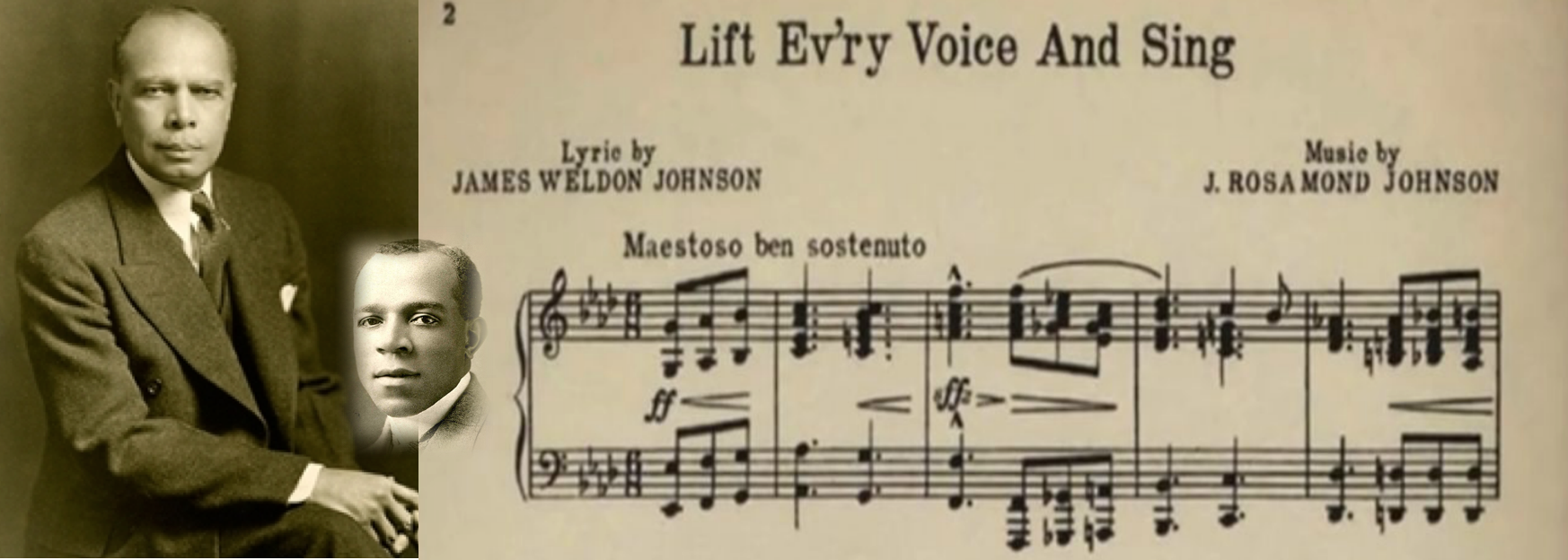In grade school I remember standing in assembly to sing “Lift Every Voice and Sing” shoulder to shoulder with my peers. One lucky student would drum the rhythm walking up the center aisle of the chapel, once he reached the stage the principal queued everyone to begin, “Lift every voice and sing, till’ earth and heaven ring, ring with the harmony of liberty.” At the time I didn’t know the power or the significance of my recitation and internalizing of the song or its lyrics. Growing up in a predominantly black, christian school that was my anthem, I hadn’t recited any other as religiously and didn’t hear the United States National anthem more often then I’d watch high profile professional games like the Super Bowl.
The Black National Anthem was written by James Weldon Johnson, a civil rights leader and lawyer, originally as a poem. It was performed for the first time by 500 school children at Shanton School, an all black elementary school where Johnson was principal, in Jacksonville, Florida in celebration of President Lincoln’s birthday on February 12, 1900. For the occasion Johnson’s brother, John Rosamond Johnson, set music to the poem. Afterwards the NAACP adopted “Lift Every Voice and Sing” in 1919 as it’s official song and it became an influential piece within the Civil Rights Movement representing black excellence, a theme that engulfed my school which motto states, “Excellence or nothing at all”. Many parents, schools and churches did their part to make sure that their children knew the words of the song that celebrated Black survival in the United States.
Addressing Criticism of Black Separatism
Although the song has been widely accepted by African Americans, it has been met with criticism. African American Professor Timothy Askew of English at Clark Atlanta University, a historically black college views the song as separatist and racially divisive with it’s naming especially as the Black national anthem, To sing the ‘black national anthem’ suggests that black people are separatist and want to have their own nation. This means that everything Martin Luther King Jr. believed about being one nation gets thrown out the window.” he argues that,”In all essence there is no specific reference to black people in this song. It lends itself to any people who have struggled”. While I understand Askew’s argument the naming of the song as the Black National Anthem doesn’t assert that Blacks are separatist entirely, although many may be, the song actually points to the fact the Black Americans, decedents of slaves have their own distinct national culture that isn’t currently recognized or praised in the United State’s ‘official’ national anthem.
The lack of cultural recognition for Blacks who played a irrevocably essential part in the building of the United States, in the American National Anthem which for a people who demand to be celebrated, calls for their own national anthem. African Americans who see themselves missing from the conversation, rather than bowing out of it, create their own. This has happened in so many fields from fashion to education and our inventiveness has been re-appropriated and used for the wider society time and time again. We will keep creating for ourselves regardless. The Black national anthem is a song that praises our efforts throughout history, pays respect to our ancestors, refuses to relinquish our identity, calls for our survival, encourages our struggle and recognizes the Black experience in America and if that struggle resonates with others than they are invited to join us in the celebration of perseverance.
Lift Every Voice and Sing
James Weldon Johnson, 1871 – 1938
Lift every voice and sing, ’til earth and heaven ring,
Ring with the harmonies of liberty;
Let our rejoicing rise, high as the listening skies,
Let it resound loud as the rolling sea.
Sing a song full of the faith that the dark past has taught us,
Sing a song full of the hope that the present has brought us;
Facing the rising sun of our new day begun,
Let us march on ’til victory is won.
Stony the road we trod, bitter the chastening rod,
Felt in the days when hope unborn had died;
Yet with a steady beat, have not our weary feet
Come to the place for which our fathers sighed?
We have come over a way that with tears has been watered,
We have come, treading our path through the blood of the slaughtered,
Out from the gloomy past, ’til now we stand at last
Where the white gleam of our bright star is cast.
God of our weary years, God of our silent tears,
Thou who has brought us thus far on the way;
Thou who has by Thy might, Led us into the light,
Keep us forever in the path, we pray.
Lest our feet stray from the places, our God, where we met Thee,
Lest, our hearts drunk with the wine of the world, we forget Thee;
Shadowed beneath Thy hand, may we forever stand,
True to our God, true to our native land.

